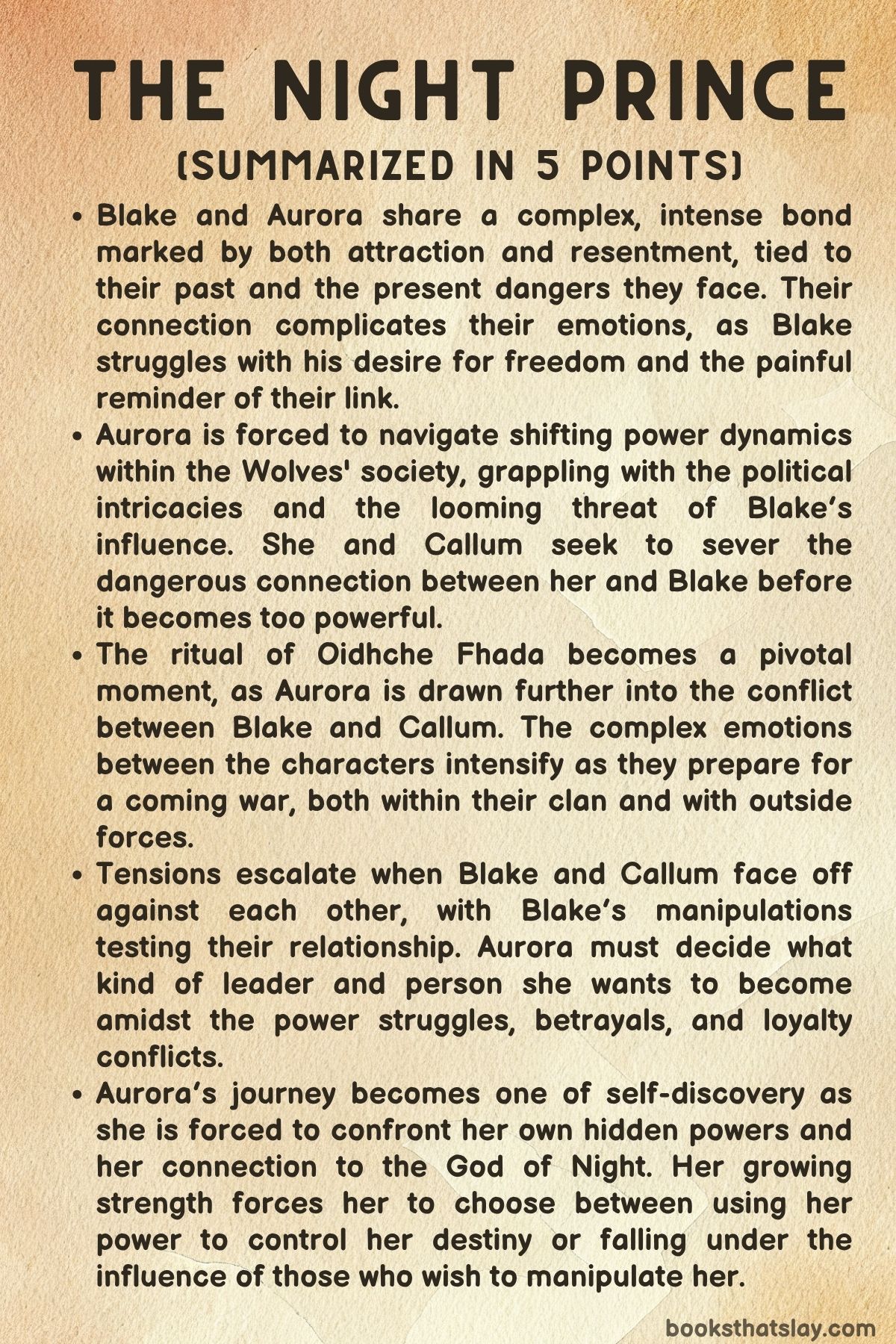The Night Prince Summary, Characters and Themes
The Night Prince by Lauren Palphreyman is a thrilling supernatural novel that blends political intrigue, romance, and deep emotional turmoil. Set in a world where power dynamics between wolf clans, ancient gods, and personal relationships are constantly in flux, the story follows Aurora, a woman caught in the midst of a turbulent and dangerous struggle.
Bound by an intense, complicated connection with Blake, a man who holds both the key to her power and a dark past, Aurora must navigate her relationships with Blake, Callum, and other figures from her past while wrestling with her identity and the overwhelming power within her. The story explores themes of manipulation, loyalty, betrayal, and the quest for freedom, all set against the backdrop of a world on the edge of war. Aurora’s journey is a fight for survival, self-discovery, and control over her own fate.
Summary
In the prologue of The Night Prince, Blake finds himself trapped in a surreal dream where shadows come alive around him, creating an eerie atmosphere. He is in a prison corridor, sensing the presence of Aurora, a woman with whom he shares a mysterious and complicated bond.
Blake’s feelings for her are a mixture of intense desire and loathing, driven by the internal struggle between his physical attraction to her and the resentment he feels about their connection. As they find themselves in an even darker place within the dream, Blake confesses that the bond between them serves as a painful reminder of his inability to attain the freedom he longs for.
The vision fades, and Blake’s frustration grows, leaving him torn between his conflicting emotions toward Aurora.
Aurora, meanwhile, wakes from a fever dream in the real world, still shaken by the intense emotions she experienced. Callum, her confidant, is concerned for her health and well-being, and the two discuss their difficult situation.
Callum is wary of Blake’s true intentions and expresses his concerns about the dangerous connection between Aurora and Blake. Aurora, still reeling from a violent encounter with James, has her doubts about Blake, but she knows she cannot ignore the realities of the power struggle between the wolf clans.
Callum and Aurora agree that they must break the bond between her and Blake, as it is growing stronger and more dangerous. They are also confronted by the threat of James, who has Fiona in his custody, which further complicates their plans.
As tensions rise, Blake calls a meeting of his clan to strategize against their enemies. His manipulative tendencies become more apparent, and Aurora finds herself drawn to him despite her knowledge of his darkness.
Her internal struggle intensifies as she contemplates the impact of the upcoming Oidhche Fhada ritual, tied to the powers of the Moon Goddess. This ritual could give one side the upper hand in the battle for control, and Aurora realizes that her role in the conflict may be far more critical than she initially believed.
She must navigate the treacherous dynamics of loyalty, power, and betrayal, all while grappling with her growing feelings for both Blake and Callum.
In Chapter Seven, Callum’s restlessness intensifies as the Oidhche Fhada ritual draws nearer. He is preoccupied with the idea of war, both within the clan and beyond.
As Callum prepares for the possibility of conflict, the two grow more familiar with the castle’s quiet life, observing the calm interactions between the other residents, such as Arran and Elsie. The arrival of the alpha, Lochlan, sets the stage for the ritual, and the tension in the castle becomes palpable.
Callum’s concerns about Blake’s intentions become clearer, and his suspicions grow.
On the night of the ritual, the air is thick with tension. Aurora becomes increasingly aware of Blake’s manipulation, and her fear of the impending lunar eclipse deepens.
She finds herself drawn into a complex web of emotions, as Callum’s growing desire to claim her is balanced with his reluctance to embrace his wolf side. Their relationship becomes more passionate and intense, with Callum struggling to reconcile his love for Aurora with his dominant wolf instincts.
Despite his internal conflict, Callum’s desire to possess Aurora intensifies, and this emotional turmoil escalates during the ritual.
The conflict between Blake and Callum reaches a climax when Blake marks Aurora as part of his clan, an act that forces her into an even deeper emotional and physical struggle. Blake’s calculated moves push Aurora into a state of turmoil, and the power dynamics between the three characters shift dramatically as the tension rises.
Aurora finds herself torn between her growing connection to Blake and her loyalty to Callum, and she must confront the reality of the dangerous world she is caught in.
By Chapter Thirty, the situation becomes even more volatile when James forces Blake into an uncomfortable position. James demands that Blake kiss Aurora as a condition for her release, testing Blake’s loyalty to Callum.
Though Blake is reluctant, he refuses to comply with James’s manipulative tactics, emphasizing that any attempt to create a rift between him and Callum will fail. However, Callum’s silence on the matter only deepens Aurora’s confusion, and when Blake finally kisses her, Aurora is overwhelmed by a rush of conflicting emotions—desire, anger, and a primal connection to him.
The tension escalates further when an attack from Alexander’s forces interrupts the confrontation. A violent battle ensues, with Callum and Blake fighting to protect Aurora.
Despite being shot twice, Blake’s focus remains on getting Aurora to safety. They manage to escape, but Alexander’s pursuit continues relentlessly.
Blake, weakened from his injuries, opens up to Aurora about his traumatic past, revealing his vulnerability and deep emotional scars. This moment of raw honesty brings Aurora closer to understanding the man she has been forced to rely on, and she begins to see Blake in a new light.
As their escape takes them to the Grey Keep, the weight of their situation becomes even more apparent. Aurora realizes that she is caught between powerful forces that are constantly vying for control over her.
She is no longer a passive participant in the conflict; instead, she finds herself at the center of an ancient struggle between the clans and the gods.
Aurora is subjected to both emotional and physical torment, held captive in an amphitheater by Alexander, who intends to break her. Aurora attempts to manipulate him by pretending to have knowledge of the God of Night, but as she is tortured, she feels a surge of power within herself.
The battle outside intensifies as the Wolves begin to fight back, and Aurora must decide whether to unleash her hidden power or remain a victim. In the final moments of the chapter, Aurora taps into her strength, confronting the darkness and unleashing a powerful force to combat the serpent-like creature that threatens them all.
By the following chapter, Aurora is on the brink of self-realization. Her connection to the God of Night, and the power that has always resided within her, becomes clear.
Blake’s dark past and his ties to the ancient god complicate Aurora’s understanding of their relationship. As the survivors regroup after the battle, Blake offers Aurora a choice: join him and use their combined power to take control, or refuse and risk everything.
Aurora’s struggle for survival, trust, and control intensifies, and her connection to Blake becomes even more fraught with complexity. As her power grows, Aurora must choose whether to destroy those who have wronged her or to forge an alliance that may ultimately cost her soul.
In the final moments of the story, Aurora reflects on the hidden truths about her family and the true reasons behind her father’s cruelty. She discovers that she is the “Heart of the Moon,” a powerful bloodline connected to the God of Night.
Her choices become even more complicated as she realizes that she is no longer just a pawn in a larger game but a key figure in an ancient struggle. Aurora must decide whether to use her power for good or to embrace the darkness within her, and the stakes of her decision are higher than ever.

Characters
Blake
Blake is a character enveloped in internal conflict and emotional turmoil. At first, he appears as a manipulative, power-hungry figure, capable of using those around him to achieve his own goals.
His connection to Aurora, however, reveals a deeper layer to his personality. The intense attraction he feels toward her is laced with resentment, as it reminds him of his inability to break free from his own circumstances.
His conflicting emotions—desire and loathing—shape his interactions with Aurora, and his manipulation becomes more evident as the story progresses. Despite his cruel tendencies, Blake’s vulnerabilities come to the forefront, particularly when his past trauma is revealed.
His struggles with fear and abuse, especially the strained relationship with his mother, evoke empathy for him as a character who is scarred by his past. Blake’s actions in key moments, such as refusing to kiss Aurora under James’ pressure, reveal his reluctance to be fully controlled by others, even as he finds himself entangled in power struggles.
Throughout the story, Blake’s complexity grows, showing him not just as a villain, but as someone caught between his dark nature and the possibility of redemption.
Aurora
Aurora is at the heart of the story, embodying the tension between vulnerability and inner strength. From the start, she is introduced as a character who is physically and emotionally entangled in the world of the Wolves, struggling to understand her connection to Blake and the power she holds.
Her journey is one of self-discovery, as she navigates her complicated relationships with the men around her, including Blake and Callum. Initially, Aurora seems to be a pawn in the power games played by the alphas, but as the story progresses, her own strength and potential emerge.
Aurora’s struggle with her bond to Blake, alongside the looming threat of the God of Night, forces her to reckon with her destiny and the power that lies dormant within her. Her emotional journey is fraught with internal conflict, as she is torn between love and loyalty, as well as the desire for independence.
By the end of the story, Aurora is no longer a passive character but one who actively challenges her fate and begins to confront the powerful forces controlling her.
Callum
Callum serves as both a protector and a conflicted love interest in the story, with his loyalty and devotion to Aurora being constantly tested. He is depicted as an alpha with strong instincts, yet his deep feelings for Aurora complicate his ability to embrace his full wolf nature.
Callum’s emotional struggle centers around his desire to protect Aurora while maintaining control over his dominant nature. He is often torn between his love for her and his alpha instincts, which push him toward possession.
Callum’s dedication to the fight against the clans and his tactical mind make him a formidable figure in the political intrigue that surrounds the Wolves. His suspicion of Blake’s true intentions reflects his protective nature and his drive to safeguard Aurora.
As the story progresses, Callum’s struggle to reconcile his love for Aurora with his need for control becomes a central aspect of his character arc. While Callum’s actions are driven by his strong feelings for Aurora, his internal conflicts make him a layered character whose journey is just as much about self-control as it is about love.
James
James is introduced as a manipulative and power-hungry antagonist whose motivations center around exploiting others for his own gain. His desire to control Aurora is driven by his ambition and need to test the loyalty of the alphas, particularly Blake and Callum.
James’s ruthlessness is highlighted in his treatment of Aurora, using her as a pawn in his schemes and forcing Blake into difficult situations to advance his own interests. His actions are often calculating, and his role in the power struggle among the Wolves positions him as a key antagonist.
However, James’s motivations are not entirely driven by malice—there is an underlying need for control and a desire to prove himself within the hierarchy of the Wolves. His confrontations with Blake and Callum reveal his strategic mind, but his inability to fully understand the complexities of human relationships makes him a dangerous and unpredictable character.
As the story progresses, James’s influence continues to loom over the other characters, pushing them into ever-deeper moral dilemmas.
Lochlan
Lochlan, as the alpha who arrives at the clan during a period of political tension, plays a significant role in the power dynamics of the story. His presence adds to the looming threat surrounding the ritual of Oidhche Fhada, a pivotal event that underscores the shifting loyalties within the clan.
Lochlan’s character is marked by his authoritative nature, embodying the traditional strength of a leader. Though his role in the narrative is somewhat secondary, his interactions with other characters, especially Callum, help to highlight the internal power struggles that define the Wolves’ society.
Lochlan represents the established order of the clan, and his arrival signals a turning point in the ritual and the upcoming conflict. His demeanor and leadership style contrast with Callum’s more emotional and protective approach, offering a glimpse into the different types of leadership within the Wolves’ world.
Duncan
Duncan plays a smaller, yet crucial role in the story as an enforcer of James’s commands. His presence during the emotionally charged scene with Aurora, where he threatens her with a dagger, reflects the lengths to which James is willing to go to assert control.
Duncan’s actions are often dictated by loyalty to James, and he serves as an instrument of intimidation in the power struggles that define the story’s central conflict. Though his character lacks the depth of some of the other figures, Duncan’s role in physically enforcing James’s will places him at the heart of the tension between the alphas.
His character highlights the themes of control and power dynamics that permeate the narrative, though his lack of independent motivation or agency makes him more of a tool than a fully realized antagonist.
Alexander
Alexander is a formidable and enigmatic figure who represents the larger external threats to Aurora and her companions. His manipulation of power and his role as a catalyst for the conflict between Blake and Callum showcase his influence over the narrative.
Alexander’s actions, particularly his role in the scene with Aurora’s torment in the amphitheater, reveal his dark, controlling nature. His desire to “break” Aurora and manipulate her power exposes the depth of his cruelty and ambition.
Alexander’s character is marked by his belief in his own righteousness, as he justifies his actions by claiming they are for a greater cause. His presence in the story serves to amplify the stakes, as Aurora must face not only her personal struggles but also the threat of those who seek to control her.
Alexander’s connection to the broader conflict within the Wolves’ society makes him a pivotal figure in the overarching power struggle.
Themes
Power and Control
The struggle for power permeates every layer of The Night Prince, particularly in the relationships between Aurora, Blake, and Callum. Throughout the story, Aurora is constantly at the mercy of the manipulative forces around her, primarily Blake, who employs his control over her physical and emotional states.
His dominance is exhibited through actions like marking her as part of his clan, using their bond as leverage to manipulate her decisions. This external struggle for power is mirrored by Aurora’s internal battle for autonomy.
She feels trapped in a web of control, not just from Blake, but from James, Callum, and even her own abilities, which she is learning to harness. The constant shifting of power dynamics forces Aurora into difficult decisions, questioning her own desires, her worth, and how much she is willing to sacrifice for the sake of survival and freedom.
Blake’s manipulative tactics highlight the dark side of power—how it corrupts and isolates those who seek it. Yet, it is through this dynamic that Aurora begins to understand her true nature and the vast power she possesses, ultimately shaping her path toward self-empowerment.
This exploration of power, both internal and external, defines Aurora’s journey and forces her to reconcile her role in a world built on manipulation, loyalty, and betrayal.
Identity and Self-Discovery
Aurora’s journey is one of self-discovery, where she is continually challenged by the revelation of who she truly is. From the beginning of the story, she is presented as a pawn in a larger political game, caught between the manipulative tactics of Blake and the protective instincts of Callum.
However, as the story progresses, Aurora’s sense of self becomes increasingly pivotal. Her connection to the God of Night and the revelation that she is the “Heart of the Moon” make it clear that she is not just a victim of circumstance but a powerful figure with an important destiny.
Aurora’s growth in understanding her own power is a critical theme, as it forces her to confront not only her inherited abilities but the consequences of wielding such power. The internal struggle she faces—between using her abilities for revenge or for the greater good—adds complexity to her identity, challenging her moral compass.
This theme explores the complexities of self-worth, power, and the responsibility that comes with realizing one’s true potential, as Aurora grapples with defining who she wants to be in a world that continuously shifts her role.
Loyalty and Betrayal
Loyalty and betrayal are recurrent themes throughout The Night Prince, especially as Aurora navigates her relationships with those around her. Callum, who initially presents himself as her protector, struggles with his own allegiance to his clan and the looming conflict with Blake.
While he cares deeply for Aurora, his loyalty to his people and his own alpha instincts often conflict with his feelings for her. This creates an emotional tension between him and Aurora, leaving her questioning where his true loyalty lies.
Blake, on the other hand, presents a more complex portrait of betrayal, as his feelings for Aurora mix with his desire for power. His actions toward her, such as marking her as his own and forcing her into situations where she must choose sides, reflect his inner conflict between loyalty to his own desires and loyalty to the people he manipulates.
Meanwhile, Aurora must reconcile her feelings for both men, caught between them in a world that thrives on shifting allegiances. The constant back and forth between loyalty and betrayal highlights the precariousness of trust in their world, where relationships are often determined by power dynamics and survival rather than genuine emotional connection.
Love and Desire
The theme of love and desire is intricately explored in The Night Prince, particularly through the complicated and sometimes toxic relationship between Aurora and Blake. Their bond is a mixture of attraction and loathing, one that serves as both a source of power and a deep emotional burden for Aurora.
While she is drawn to him physically, she resents the control he exerts over her, which creates a push-pull dynamic that is difficult to navigate. At the same time, there is an undeniable chemistry between them, and Aurora’s internal conflict becomes a driving force in the narrative.
Callum’s relationship with Aurora also explores love, though it is less about manipulation and more about the complexities of connection. His desire to protect her is counterbalanced by the primal nature of his wolf instincts, which often create tension in their interactions.
The theme of love in this context is not just about romantic attraction but also about power, vulnerability, and the difficult choices individuals must make when their emotions and desires conflict with their larger goals and survival.
Revenge and Redemption
Revenge and redemption play significant roles in Aurora’s development, particularly as she learns more about her past and the wrongs done to her. The manipulation she faces from James, Blake, and others pushes her to seek vengeance, particularly when she uncovers the dark secrets of her family and the abuse she suffered as a child.
As Aurora becomes more attuned to her power, the urge for revenge grows stronger, tempting her to use her abilities to exact retribution on those who have wronged her. However, this path of vengeance is not without its costs, as it forces her to confront her own moral boundaries and what she is willing to sacrifice in the process.
In her pursuit of justice, Aurora must decide whether revenge is the answer or if there is a possibility for redemption—both for herself and those who have harmed her. This theme is central to her growth as it shapes her understanding of power, responsibility, and the true cost of justice.
It also raises the question of whether one can ever truly be redeemed or if their past actions will always define their fate.


